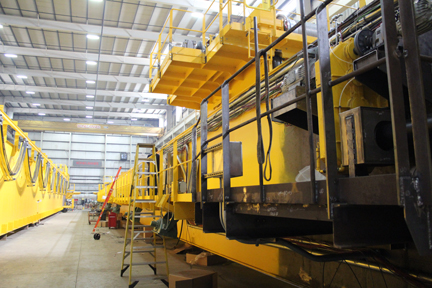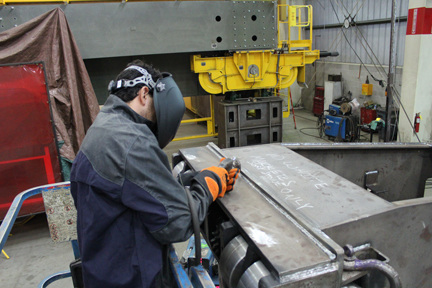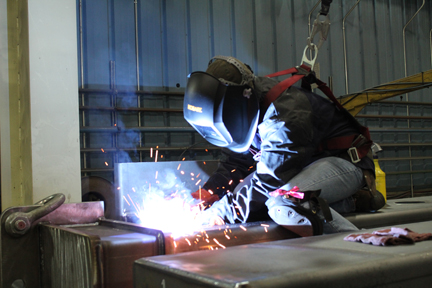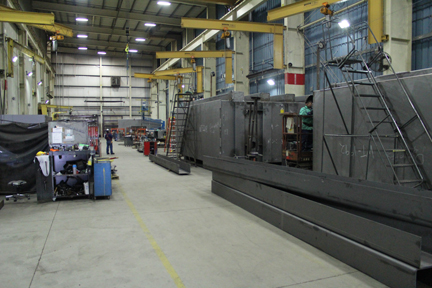Weldall Manufacturing Reduces Weld Cracking, Improves Productivity with Switch to Gas-Shielded Flux-Cored Wire
In four decades, Weldall Manufacturing has grown from a one-man operation in a rented room to a full-service metal fabrication and metal processing manufacturer. The Waukesha, Wisc.-based job shop specializes in medium to large weldments — some as large as 200,000 pounds — for customers in industries that include power generation, wind energy, nuclear power, construction equipment, mining and railcar fabrication.
The family-owned company’s steady growth (they now have 215 employees housed in a 200,000 square foot facility) has been fueled in part by Weldall’s continual search for ideas, technologies and methods that help improve their value to existing and potential customers. Passing productivity, quality and cost savings on to their customers is key.

manufacturer that specializes in medium to large weldments — some as
large as 200,000 pounds — for customers in industries that include power
generation, wind energy, nuclear power, construction equipment, mining
and railcar fabrication.
“We’re known for our quality,” says Weldall quality manager Scott Lenzner. “We take pride in being known as a very high quality, effective shop and getting our parts out in a timely manner to the customer. That’s what it’s all about.”
Because Weldall produces many different types of products to meet customer orders and specifications, the company works with varying types of welding processes, wires and materials, including stainless steel, aluminum, and high- and low-strength steels. They also must meet a range of welding codes, including some specified by the customer.
“Our customers expect a good product for a fair price delivered on time,” says plant manager David Bahl Jr., whose father launched Weldall in 1973. “We produce a lot of sophisticated weldments for industries that require a lot of documentation and a lot of high engineering.”
That high variability in welding projects and materials — and in the requirements and specifications — can lead to efficiency and standardization challenges for Weldall.
“The challenges are in the everyday process here at Weldall, to do that in a timely manner — keep it efficient, try and keep rework costs to a minimum, reduce weld cleaning,” Lenzner says.
Using the best equipment and consumables possible for each application helps Weldall get the job done correctly and quickly.
After experiencing some problems with the wire they were using on some flux-cored arc welding jobs, Weldall switched to a Hobart wire — FabCO® 712M — for those processes. The change eliminated the cracking and weld rework, leading to savings and improved productivity. The company now uses the wire throughout its facility for a variety of semi-automatic welding applications, as well.
Cracking challenges
Weldall employees began noticing cracking issues when welding with a flux-cored all-position welding wire. These in turn caused a hold on production for an immediate investigation to find the root cause.

were using on some flux-cored arc welding (FCAW) jobs, Weldall switched
to a Hobart wire — FabCO 712M. The change helped Weldall reduce issues
with cracking and weld rework, leading to savings and improved productivity.
“It was quite extensive for the amount of rework and everyone’s time involved with this process,” Lenzner says. “The amount of welds cut out and replaced was extremely time consuming and costly.”
The company started working through various scenarios in an effort to figure out what might be causing the problem. During that process, they heard from a customer having similar problems with the same brand of wire.
“The cracking was coming in longitudinal and transverse, and it was on a very important product that had to have leak-tight welds,” Lenzner says. “It sounded like there was a chemistry issue with the wire. So we opted to look for a different brand of wire.”
Weldall brought in several different brands of wire for testing, including the Hobart wire, which the shop had been using for some other jobs. For the flux-cored process under review, they chose the Hobart FabCO 712M, a gas-shielded flux-cored wire with low hydrogen levels that has reduced cracking and the associated rework, and also spatter, which means Weldall spends less time on post-weld cleaning.
“The 712M just seemed to fit really well,” Lenzner says. “It’s a very smooth running wire — more cost-effective, requires less rework and has less cleaning issues. It was just kind of a no-brainer.”
Benefits for quality and productivity
By reducing the occurrence of weld cracking with the switch to a wire with low hydrogen levels, Weldall improved productivity, while also reducing the time and money spent on rework. The FabCO 712M wire also runs a bit faster, which contributes to improved productivity.
“The real savings and the real look at the wire comes from all of our experienced people, who definitely think the 712M runs better, that it runs a little bit faster, a little bit smoother,” Lenzner says. “I’ve got no complaints. I deal with all the rework, so when you don’t deal with it as much, Customers are happy and life is easier.”
The all-position wire does well for Weldall in vertical welds, helping improve efficiency for the company’s welding operators, since they don’t have to turn weldments as often and can complete out-of-position welding more efficiently.
“This wire performs for us with less flipping,” Lenzner says. “It helps keep the weldment straighter, flatter, with less twisting.”

for Weldall and also reduces spatter, which means less time spent on post-
weld cleaning for the company’s welding operators.
Because so much of what Weldall produces is eventually painted, issues with cracking caused by the previous wire posed not only quality issues, but also weld aesthetic problems that frustrated the welding operators.
“There’s a lot of difference between this wire and the other one,” says Weldall welding operator Cesar Corona. “We don’t have cracking anymore. It’s much easier, compared to the other wire, because you can see the weld fusion better and it looks much better.”
Weldall is using Hobart wire in its welding operator training facility and has experienced good results there, as well.
“We’ve found our training is also a lot smoother and easier to transition with this wire,” Lenzner says. “So I think it’s a great wire that we’re running now.”
Reduced cleaning
The Hobart wire has minimized unnecessary post-weld cleaning for Weldall. The company sees less spatter, and the slag produced by the wire falls off easily. That saves time for the welding operators — and allows them to spend more time on welding.
“We see a lot less cleaning written down during the inspection process, so that’s a good thing,” Lenzner says. “It really helps in the inspection, because it reduces the time spent looking at all the welds.”
A good partnership
It was important to Weldall management to choose a wire supplier that is also a good partner. In addition to wanting a high-quality wire, they didn’t want to worry about issues with getting the product or maintaining the wire certification.

housed in a 200,000 square foot facility) has been fueled in part by Weldall’s
continual search for ideas, technologies and methods that help improve their
value to existing and potential customers. Passing productivity, quality and
cost savings on to their customers is key.
“If we don’t have the product, we can’t produce the parts,” Lenzner says. “It’s very important that a phone call gets you what you need. Our customers expect the service, they expect a quality product, and when we buy our wires and our consumables, we also expect the same thing.”
Due to the large variety of jobs they produce, Weldall also often needs special lots of wire, such as when a customer requires them to have one lot number for the entire job.
“We need somebody that can stand behind the product, and that the quality is without fail — just like our customers expect of our products,” Bahl says. “Hobart has done that very well.”
When quality is critical
In choosing a new wire for some of their welding processes, Weldall wanted a quality product and a reliable and flexible partner to help them address issues with weld cracking.
“A lot of our parts here are high liability,” Bahl says. “We cannot have a product here that is substandard or that will lend itself to rework and bad welds. It’s just something that Weldall can’t deal with and neither can our customers.”
A switch to the Hobart FabCO 712M wire resulted in improved quality and efficiency for Weldall, with the added benefit of having a product that is easy-to-use and runs smoothly.
“Working with Hobart has been a pleasure,” Bahl says. “They came in when we were struggling with another wire, where we had several rework issues and they replaced that wire, and to this day we don’t have any issues.”



